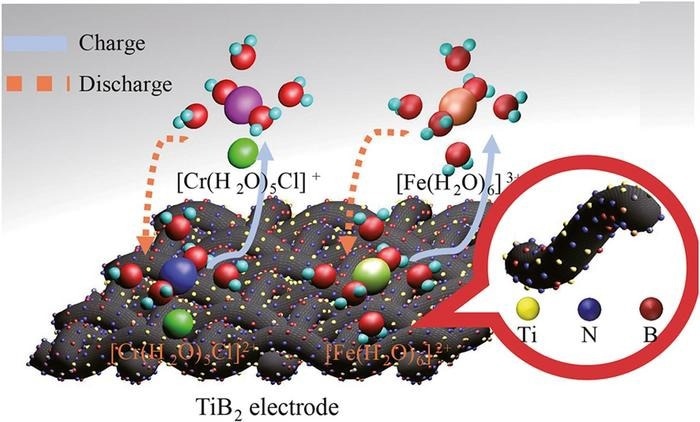Reviewed by Lexie CornerJun 6 2024
Researchers at the State Key Laboratory of Heavy Oil Processing, China University of Petroleum Beijing, have made significant advancements in battery technology that could transform how energy is stored and used, particularly for large-scale applications. These results are published in Green Energy and Intelligent Transportation.
 Preparation of N-B doped composite electrode for iron-chromium redox flow battery. Image Credit: GREEN ENERGY AND INTELLIGENT TRANSPORTATION
Preparation of N-B doped composite electrode for iron-chromium redox flow battery. Image Credit: GREEN ENERGY AND INTELLIGENT TRANSPORTATION
The team, led by Yingchun Niu and Senwei Zeng, developed a new N-B-doped composite electrode for iron-chromium redox flow batteries (ICRFB), which showed substantial improvements in performance and efficiency.
Iron-chromium redox flow batteries are critical in tackling the challenges of renewable energy sources, such as solar and wind, which frequently experience variability in energy delivery. These batteries offer a realistic alternative for balancing energy networks and providing a consistent energy supply. The traditional carbon cloth electrodes employed in these batteries have drawbacks, including limited electrochemical reactivity and energy efficiency.
The innovation includes the use of a titanium composite carbon cloth electrode doped with boron (B) and nitrogen (N), which considerably improves battery performance. Using TiB2 catalysts and employing high-temperature calcination procedures, the researchers generated electrodes with improved physicochemical qualities, enhancing battery reactivity and efficiency.
The modified electrodes demonstrated significant improvements in discharge capacity and energy efficiency. After 50 charge/discharge cycles, the novel electrode had a discharge capacity of 1990.3 mAh, which was much greater than the 1155.8 mAh provided by standard electrodes. Additionally, energy efficiency was maintained at roughly 82.7 %, a significant gain over the baseline.
These enhancements are due to N-B co-doping's increased surface area and electrochemical activity. The doped electrodes provide more active sites for redox reactions, which are critical to the energy storage process. The use of the Ti catalyst improves the kinetics of the processes involved, resulting in quicker and more efficient energy transfer.
This invention not only provides a more effective way to store and use energy, but it also lowers the cost and environmental impact of standard battery materials. The utilization of iron and chromium, which are more available and less expensive than other metals such as vanadium, makes ICRFBs a more sustainable and economically viable alternative for large-scale energy storage.
The researchers believe this technology could significantly impact the renewable energy market by providing a more dependable and efficient method of integrating renewable sources into the electricity grid.
With more study and development, these doped electrodes could contribute to increased usage of redox flow batteries, assisting in the shift to more sustainable energy options.
This advancement represents a significant step forward in battery technology, promising to improve the capabilities of energy storage systems around the world and support the widespread adoption of renewable energy sources, ultimately contributing to global efforts to combat climate change and promote sustainability
Journal Reference:
Niu, Y., et al. (2024) Preparation of N-B doped composite electrode for iron-chromium redox flow battery. Green Energy and Intelligent Transportation. doi:10.1016/j.geits.2024.100158